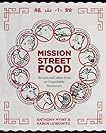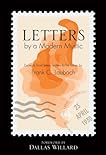 Mission Street Food: Recipes and Ideas from an Improbable Restaurant by Karen Leibowitz
Mission Street Food: Recipes and Ideas from an Improbable Restaurant by Karen Leibowitz
My rating: 5 of 5 stars
“Cookbook” doesn’t begin to touch this amazingly honest, engaging, inspiring, and creative narrative about two people, their friends, their perseverance, their sheer luck, and the joy to be had in both dreams and realities.
From flatbreads on a food truck to a full-fledged restaurant, Mission Street Food is a tale told in the words of its two heroes, chef Anthony Myint and his wife, Karen Leibowitz. It is the story of a “start-up” like no other, set on the streets (mainly one street) of San Francisco, transforming a “mom-and-pop” Guatemalan snack cart into a thriving and charitable food experience. The authors aren’t shy about sharing the many bumps in the road, but both Myint and Leibowitz write with an enviable sense of humor in the face of each challenge. Leibowitz recalls opening night on the food truck, as a line of people formed down the block:
“It had never occurred to us that we might have more than a few customers at a time, so we had no system for organizing orders. On the fly, I decided to give each person a letter, which was a big mistake. A lot of letters sound the same, so I spent the night yelling things like “Order D! D as in Depeche Mode!” It was like taking a free-association test in front of a hundred people. I had no cash register, of course, so I kept ones and fives in my front pockets, tens and twenties in my back pockets—a regular carnie.”(p.31).
When Myint and Leibowitz found more permanent facilities for MSF at a “decrepit Chinese joint,” they continued to surmount obstacle after obstacle, all the while creating unique and inspired cuisine, at no profit. One gets a sense the venture was one part grassroots endeavor to two parts spontaneity that would rival 1960s “Happenings.” In amidst the entertaining tales of small victories and near-mishaps, Leibowitz tucks in what ultimately makes this book so very appealing:
“When we got home, I felt exhausted to the point of despondency, but I also felt a little bit sentimental. Anthony had become a chef. I had become a restaurant manager/dishwasher. Our friends were pulling for us. We were incompetent. We were successful. Nothing made any sense. I felt really lucky.” (p. 54).
And truly that’s what this book is about. You need not be a “foodie” or even remotely interested in starting a restaurant in order to enjoy this remarkable project. Myint and Leibowitz are testaments to the value of spirit, energy, friendship, and love. Their story is one of turning dreams into living one’s life to the fullest, rather than waiting for “something to happen.” It is hard not to be inspired by Mission Street Food, and you’ll find yourself smiling and laughing along with the authors. Along the way, you’ll also learn how portion your own steaks from a rib roast, how a CO2 charger might provide 30 seconds of pure joy for your dinner guests, and that jalapeños and snickerdoodles can make excellent bedfellows.
Read this book for the fantastic photographs. Read this book for the excellent writing and the entertaining story. Read this book for the comic strip on pages 37-44. Read this book for recipes that will challenge and inspire you. But most of all, read this book because chances are, at some point, you’ll need a reminder of your own aspirations and possibilities.
(Reposted at http://rebiscooking.blogspot.com)








